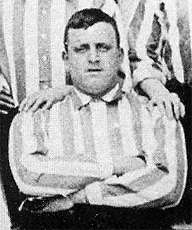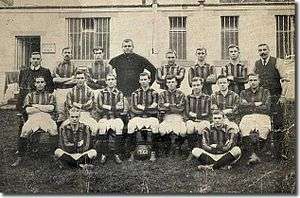William Foulke (footballer)
William Henry "Fatty" Foulke (12 April 1874 – 1 May 1916; sometimes spelled Foulk, Foulkes) was a professional cricketer and football player in England in the late 19th and early 20th centuries. Foulke was renowned for his great size (6 ft 4 in (1.93 m)[1] by some estimates) and weight, reaching perhaps 24 stone (152 kg; 336 lb) at the end of his career, although reports on his weight vary.[2]
 William "Fatty" Foulke, seen here in Sheffield United colours | |||
| Personal information | |||
|---|---|---|---|
| Full name | William Henry Foulke | ||
| Date of birth | 12 April 1874 | ||
| Place of birth | Dawley, Shropshire, U.K. | ||
| Date of death | 1 May 1916 (aged 42) | ||
| Place of death | Sheffield, West Riding of Yorkshire, U.K. | ||
| Height | 6 ft 4 in (1.93 m) | ||
| Playing position(s) | Goalkeeper | ||
| Youth career | |||
| Blackwell Miners Welfare | |||
| Senior career* | |||
| Years | Team | Apps | (Gls) |
| 1894–1905 | Sheffield United | 299 | (0) |
| 1905–1906 | Chelsea | 34 | (0) |
| 1906–1907 | Bradford City | 22 | (0) |
| Total | 355 | (0) | |
| National team | |||
| 1897 | England | 1 | (0) |
| * Senior club appearances and goals counted for the domestic league only | |||
Playing career
He played four first-class matches for Derbyshire County Cricket Club in the 1900 season, but is remembered primarily as a goalkeeper for Sheffield United although he later played for Chelsea and Bradford City.
After being discovered playing for village side Blackwell in a Derbyshire Cup tie at Ilkeston Town, Foulke made his debut for Sheffield United against West Bromwich Albion on 1 September 1894 and led the team to three FA Cup finals (winning two) and a League Championship.
According to The Cat's Pyjamas: The Penguin Book of Cliches (ISBN 9780141025162), the "Who ate all the pies?" chant was first sung in 1894 by Sheffield United supporters, and directed at Foulke's 300 lb (about 136 kg).[3] This is disputed, however, as a September 2019 article on the BBC Sport website pointed out that the tune to which the chant is sung, "Knees Up Mother Brown", is believed to have originated in 1918, which was some two years after Foulke's death.[4] Foulke also weighed only 178 pounds (81 kg) in 1894 and the weight gain came much later.[5]
He also won a single international cap for England in 1897 against Wales.
At the end of the first match in the 1902 FA Cup Final, Foulke protested to the officials that Southampton's equalising goal should not have been allowed. Foulke left his dressing room unclothed and pursued the referee, Tom Kirkham, who took refuge in a broom cupboard. Foulke had to be stopped by a group of F.A. officials from wrenching the cupboard door from its hinges to reach the hapless referee.[6][7] In the replay, Sheffield United won 2–1, with Foulke being required to make several saves to keep United in the match. He was also in goal for United when they suffered an FA Cup exit to Second Division Burslem Port Vale in 1898.

He then moved to Chelsea for a fee of £50 and was made club captain. Foulke by now was remarkably temperamental. If he thought his defenders were not trying hard enough, he would walk off the field. Opposing forwards who incurred his displeasure would be picked up and thrown bodily into his goal. He was, however, a great crowd puller, and Chelsea decided to exploit this. To draw even more attention to his size, they placed two small boys behind his goal in an effort to distract the opposition even more. The boys would sometimes run and return the ball when it went out of play, and quite by accident, ball boys came into being.[8] Foulke stayed for just one season before moving to his final club, Bradford City.
At some stage after his retirement Foulkes had played a beat-the-goalie contest in Blackpool. In a short obituary to Foulkes a Blackpool newspaper reminded its readers that Foulkes had "appeared in a good [sic] scoring side-show on the spare ground, Britannia Place, South Shore, where many a football aspirant tried their goal-scoring prowess against the once noted goalkeeper" (Blackpool Times, 6 May 1916).
He also owned a beer house in Sheffield along with a shop in Matilda Street and was known to walk around his home town wearing his FA Cup winner's medal around his neck on a homemade chain.[2]
Foulke appears in the Mitchell and Kenyon films, playing in a match on 6 September 1902. His nephew, Jim Simmons, was also a professional footballer.[9]
Fact, myth and legend
Fouke was known as a crowd pleaser, with a range of unusual skills. At clearances he was able to punch the ball over the half way line - a huge advantage which could rapidly turn defence into attack. He was an expert in saving penalties and was also known to charge upfield to the penalty spot.
His love of eating was legendary and there are many stories of how he would often arrive early for breakfast, set out a meal for the whole team, and eat it all himself. He was a colourful character and it is said that a forward who offended him was picked up and held upside-down by his feet over the muddy pitch. He is also said to have sat on people who teased him until they apologised. During a match with Burton Albion he stopped two penalties and the forward who missed the penalties is said to have complained "where else could I have placed the kicks – there was nowhere else to aim".
At the end of the first match in the 1902 Cup Final Foulke protested to the officials that Southampton's equalising goal should not have been allowed. Foulke left his dressing room unclothed and pursued the referee, who took refuge in a broom cupboard. Foulke had to be stopped by a group of F.A. officials from wrenching the cupboard door from its hinges.
Whilst playing against Accrington Stanley in February 1907, it is said that Foulke's jersey clashed with the red of Stanley and no-one could find a jersey large enough to fit him, so he played wrapped in a sheet, procured from a nearby house. Bradford won the game 1-0 and Foulke did not dive during the match, so he kept a literally 'clean sheet'. It was during this game that he snapped a crossbar in two causing the match to be stopped.
To draw even more attention to his size, they placed two small boys behind his goal in an effort to distract the opposition even more. The boys would sometimes run and return the ball when it went out of play, and quite by accident, ball boys came into being.
Sayings
The football chant "Who ate all the pies" is said to have originally been about Foulke, although this is generally accepted as an urban myth. The one-liner "Call me anything you want, but don't call me late for dinner" has been attributed to him, but sources are unclear. In the Chelsea match programme for 2 December 1905 it was printed: "Foulke says he doesn't care how much they charge him, so long as they don't charge him too much for his dinner."
Death
'Fatty' Foulke died on 1 May 1916 at the age of 42 years old, two weeks and five days. He was buried in Burngreave cemetery, Sheffield, England. His death certificate gives "cirhossis" as the major cause of death.[10] The stories of pneumonia caught whilst earning pin money at a "beat the goalie" booth on Blackpool Sands seem to be without foundation.
Career stats
| Club | Season | Division | League Apps | FA Cup Apps | Other Apps | Total Apps |
|---|---|---|---|---|---|---|
| Sheffield United | 1894–95 | Division 1 | 29 | 3 | 5 | 37 |
| 1895–96 | 28 | 2 | 4 | 34 | ||
| 1896–97 | 30 | 1 | 0 | 31 | ||
| 1897–98 | 29 | 2 | 0 | 31 | ||
| 1898–99 | 32 | 9 | 1 | 42 | ||
| 1899–1900 | 33 | 5 | 2 | 40 | ||
| 1900–01 | 29 | 7 | 0 | 36 | ||
| 1901–02 | 26 | 9 | 0 | 35 | ||
| 1902–03 | 25 | 0 | 0 | 25 | ||
| 1903–04 | 28 | 3 | 0 | 31 | ||
| 1904–05 | 10 | 0 | 0 | 10 | ||
| Chelsea | 1905–06 | Division 2 | 34 | 1 | 0 | 35 |
| Bradford City | 1905–06 | 1 | 0 | 0 | 1 | |
| 1906–07 | 21 | 2 | 0 | 23 | ||
| Total | 355 | 44 | 12 | 411 | ||
Honours
- Sheffield United
- Individual
- Berlin-Britz Goalkeeper of the Decade (1900s)[11][12]
References
- "Can footballers large it?". BBC News. 7 August 2002. Retrieved 8 August 2008.
- "'Fatty' Foulke: The legend of Sheffield United & Chelsea keeper". BBC Sport. 30 August 2019.
- Evans, Rebecca (11 September 2007). "Football legend inspired pie chant". Daily Mirror. Retrieved 21 May 2008.
- "'Fatty' Foulke: The legend of Sheffield United & Chelsea keeper". 30 August 2019. Retrieved 4 September 2019.
- Phythian, Graham (2005). Colossus: The True Story of William Foulke. Tempus. p. 26. ISBN 0-7524-3274-5.
- Bull, David; Brunskell, Bob (2000). Match of the Millennium. Hagiology Publishing. pp. 30–33. ISBN 0-9534474-1-3.
- An account of the incident by the match linesman J. T. Howcroft suggests this version may be an embellishment of the facts. See "Colossus", p. 79.
- The Sunday Times Illustrated History of Football. Reed International Books Limited. 1996. p16 ISBN 1-85613-341-9
- Hogg, Tony (2005). Who's Who of West Ham United. Profile Sports Media. p. 186. ISBN 1-903135-50-8.
- Phythian, Graham (2005). Colossus, The True Story of William Foulke. Tempus Publishing. ISBN 0-7524-3274-5.
- "Messi and Ronaldo: Equal!". UPL. 8 November 2017. Retrieved 25 December 2019.
- Banyas, Volodymyr (25 October 2013). "Berlin-Britz Greatest XI by Decade" (№ 88). newspaper Ukrainskyi Futbol.
External links
| Wikimedia Commons has media related to William Henry Foulke. |
- Film of Foulke in the 1901 FA Cup Final
- BBC Guide
- William Foulke at Englandstats.com
- Chelsea profile